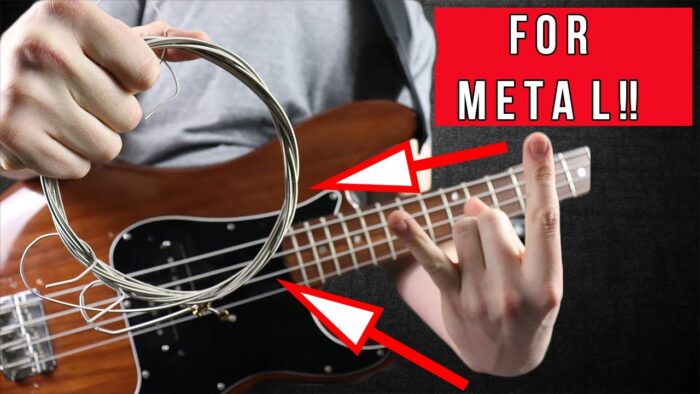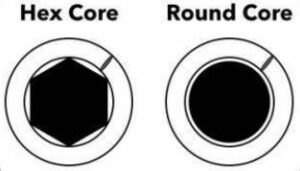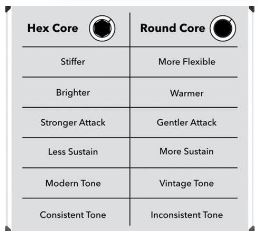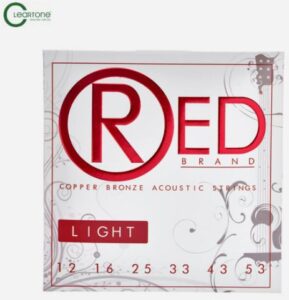Best Strings For Metal Bass. If you’re a fan of metal bass music and are in the market for new strings, there are many options to choose from. But what are the best?
Table of Contents
4 Best Strings For Metal Bass
Choosing Electric Bass Strings
The guitar strings on your electric bass play a key role in the overall sound of your bass. You can purchase a wide variety of strings from many different manufacturers online. If you are unsure what string will work best for you, try several different brands and gauges before making a final decision. This will help you find the strings that you love the most.
There are four basic types of electric bass strings. Each of these offers unique characteristics. For example, steel strings produce a brighter sound. A cobalt-alloy string will produce a more “hi-fi” bass tone. Flat wire strings are popular with jazz players and soul players. Whether you’re a beginner or an experienced bass player, it’s a good idea to have a few spare sets on hand. They can be used in the studio or for gigging.
Bass strings made with nickel-plated steel are less harsh on your fingers and frets. Nickel is considered the least magnetic material. It has a warm mid-range tone but is not as bright as stainless steel. Roundwound strings are usually wrapped with stainless steel or nickel, which gives them a brighter, piano-like tone.
Strings can also be coated for extra protection against corrosion. Coated bass strings have a special film that wraps around the outside of the metal, adding a longer lifespan. However, this may not be a great choice for a bass player who changes strings regularly.
If you’re a new bass player, you’ll probably want to purchase a set that is similar in scale length to your bass. If you are a fast player, you will prefer a lightweight set with low action. Once your fingers are used to playing on a particular gauge, you can switch to a heavier string.
Different Types of Electric Bass Strings
Roundwound and Flatwound
There are many different types of bass guitar strings available on the market. The best ones will be able to help you sound more powerful and add to the overall tone of your instrument. They can be purchased through several sources and you can try them out in a store before you buy them.
The two main types of electric bass strings are round-wound and flatwound. Roundwound strings are typically wrapped in nickel and stainless steel. These strings are known for their bright tone and piano-like sizzle. While they are often used in acoustic music, they can be a great choice for aggressive styles of play.
Flatwound strings are also an option, but these have a rounded tone profile that allows for more bloom to the E and A strings. In addition to a rounded tone, these strings also have less string noise. Many famous bass players have been spotted using these strings.
Coated bass strings are another option. These strings use a special film to provide unique characteristics and a longer lifespan. While they are more expensive, they can add some life to a set. However, you should be aware that these strings may not be ideal for players who switch them out frequently.
You can also consider cobalt alloy strings. Cobalt alloy strings offer a stronger magnetic interaction with your pickups, which can provide a more “hi-fi” bass tone. Also, they can be manufactured in a variety of gauges and lengths to meet your needs.
Nickel-plated steel strings are an old standby that is affordable and has a vintage tone. These strings are available in a range of gauges and lengths to fit most basses.
Other factors to consider when shopping for bass strings are the style of music you play and the number of strings on your bass. The best strings are often found at the store, but you can also order them online. If you’re unsure which strings are right for you, it is always a good idea to test out a few to see what you prefer.
Regardless of the type of bass strings you choose, it is important to keep in mind that each string will have a different feel and tone. Whether you want a thicker, heavier, or thinner string, it’s a good idea to try a few different gauges before you make a decision. Changing gauges can affect your neck and finger strength, so it’s a good idea to wait until your calluses are formed before making the switch.
Another important factor to consider when choosing bass strings is the type of wire used in the final winding. The wire that is used has the most impact on the way the string sounds. It is also important to look for strings with a thicker gauge because they have more mass and therefore will produce a bigger, fuller tone.
Round-core vs hex-core
Round-core and hex-core metal bass strings differ slightly in the way they sound. The key differences are the type of wire used for the core and the connection of the wrap wire. In terms of durability, the latter is more likely to survive. However, it is not as easy to tune as the former.
Round-core strings are made with a round-shaped tin-plated high-carbon steel wire. Hex-core strings use a hexagonal core wire. This gives hex-core guitar strings a more stable tone. They are also less prone to premature breakage.
Hex-core strings are easier to install. The fine edges of the core grip the external wire and hold it in place. This makes them a better choice for novice players.
Hex-core strings are slightly harder to bend, although they are easier on the hands. However, they also exhibit higher tension. While these factors may sound odd to compare, they can help you choose a set that won’t wear out too quickly.
If you’re an experienced bass player, you’ll want a string set that won’t break easily. Round cores are also a good choice if you’re looking for a lower-cost, less tangle-prone alternative.
Some bassists prefer round-core strings because of their mellower tone. Those that want a vintage feel might also opt for round cores.
Although the sound and playability of hex-core strings are considered to be the highest-end products, the actual cost may be quite a bit higher. Round cores are also a bit more expensive to manufacture. For this reason, manufacturers lean towards hex-cores.
Halfwound vs round wound
When it comes to the choice between half-wound and round-wound strings for metal bass, there are several factors to consider. The most important is which one will work best for your particular style of playing.
Roundwound bass strings produce a brighter, more aggressive sound, while flat-wound strings offer a more balanced tone. Both have their advantages and disadvantages. However, some bassists prefer the flat-wound, especially for jazz or vintage genres.
Flatwound strings are typically made of stainless steel, while round wounds can be made from nickel. Nylon-wrapped strings last longer and don’t corrode as quickly. Also, nickel and stainless steel string models have a more manageable feel.
Roundwound strings are typically available in a wider variety of gauges than flat wounds. This means they are less likely to be out of tune. However, they also tend to produce more noise when played. They have grooves on the surface that aren’t found on flat wounds.
Another major advantage of flat wounds is their smoother surface. This helps to prevent dirt from getting into the core wire. It can also reduce the noise caused by drag on the string.
Halfwounds are typically heavier gauges than flat wounds. This can make them more difficult to play. Likewise, some bassists can get calluses on their fingers when they play round wounds.
Both types of bass strings can be used for a wide range of musical styles. While some prefer a brighter sound, others prefer a darker tone.
Drop tuning
Drop tuning is a common tuning used in metal bass. It lowers the lowest string’s pitch and expands the range of the instrument. In some cases, it requires a different approach to string gauge.
When tuning down, the action of the strings is raised, resulting in a bass that is much easier to play. This is especially important for metal bass players, who need easy-to-play fast riffs.
In addition, the bottom string’s pitch is lowered, which gives a deeper 6th-string bass note. The higher action also helps to enhance sustain.
In metal, most bands use a low tuning for their basses. Although they may not always tune down to this level, it is common.
Metal musicians work hard to master their craft. They often change strings more frequently than other bassists. A common string material used in metal bass is nickel-wound steel. Pure stainless steel, new composites like cobalt, and pure nickel are also popular.
Many bands play in standard tuning or lower-tuned tunings for live performances. Slipknot, Metallica, Machine Head, and Nightwish are just a few examples. These bands have all experimented with drop tunings.
Drop C and drop B are both favored by some metal bassists. However, these tunings are not as prevalent as the standard E or B tuning.
Using these lower-tuned tunings is a great way to make your bass more aggressive and tones throughout the instrument. However, you should be careful when switching between these two tunings.
4 Best Strings For Metal Bass
Ernie Ball Regular Slinky
Ernie Ball Regular Slinky Strings are an excellent choice for metal bass players. They offer a warm, full sound with plenty of low ends. Designed with a steel hex core, they are renowned for their durability and resonance.
The patented Super Cobalt alloy wrapped around the hexagonal steel core wire creates a rich, mellow tone. The string is designed to handle a variety of tunings. Its deep, low tones allow players to slap, chop, or bend.
Players can choose from three popular gauges: 45-100, 50-105, and 45-105. The lighter gauges are recommended for metal players who prefer to lean on their strings, while the heavier gauges provide a richer tone.
Ernie Ball Regular Slinky Strings have been tried and tested.
Ernie Ball strings are known for their consistency, as well as their high-quality construction. They’re available in many different sets, including the Tone Packs. You can get the most popular types of Ernie Ball strings with these packs.
Ernie Ball has been making guitar strings for over fifty years. Their products have been used by a range of famous musicians.
Ernie Ball also produces a wide range of hybrid sets. These sets bridge the gap between the main packs and cater to players who prefer tight low strings and loose highs.
Elixer Nanoweb Long Scale
If you’re looking for bass strings that can handle the abuse of metal, look no further than the Elixir Nanoweb Long Scale. These strings are perfect for longer-scale basses that need a warmer tone. They also maintain a good balance between the highs and lows.
Although Elixir’s Nanoweb Long Scale strings aren’t the cheapest in the market, they do boast a lot of value. These bass strings have a great stainless steel sound that’s full, warm, and bright. Plus, they last for several months, saving you money in the long run.
While there are several bass string brands on the market, only one brand specializes in coated string technology. Elixir Strings re-invented the stainless steel bass string by applying a super-thin NANOWEB Coating to reduce finger squeaks and keep your instrument in tip-top condition.
The Nickel Plated Steel Bass Strings also feature the NANOWEB coating. It enhances grip, minimizes finger squeaks, and delivers a more natural feel. This string also features a round steel core and offers a richer mid-range presence.
Best Strings For Metal Bass
If you’re playing metal, you need a pronounced low end. Luckily, the Nanoweb Long Scale strings from Elixir keep your bass in the right frequency range without sacrificing too much treble. That means you’ll be able to cut through the mix, without a loss of sound.
Another bass string that’s popular among metal players is the Dunlop DBN45105. With a round core design, these strings provide a balanced and aggressive bass tone.
Cleartone strings
You don’t have to be a rocket scientist to understand why a new company, Cleartone Strings, is a huge hit with musicians of all ages. They make strings that not only sound good but are manufactured with premium US parts and labor. The company has a solid track record of innovation in the musical industry.
One of their more unique products is the EMP Treatment which protects your string from deterioration. These coated strings are a great way to keep your bass in tip-top shape for the long haul.
Best Strings For Metal Bass
It’s not a secret that metal bass players change their strings frequently. To keep the fingerboard from wearing out, they use half-round wounds and half-flat-wound strings. Not only do these string combinations give you a smooth, balanced tone, but they also provide you with more sustain.
Using these two patented technologies, Cleartone makes a slew of bass string alternatives.
What is the Best Bass String Gauge For Metal?
There are different gauges of bass strings for metal. Choosing the right type of string is crucial for the sound of your instrument. The best choice depends on your preferences and the genres you play. It is also important to take note of your budget.
When it comes to playing metal, you need to pick a set of strings that can handle a heavy load of abuse. Cobalt or stainless steel strings are perfect for this. They have a deeper, twangy tone and offer dynamic range. These are also reasonably priced. Their lifespan is quite long, making them a good choice for professional musicians.
Metal players want a pronounced low end, as well as a warm, bright sound. The type of winding is important to the sound of the string. If you want a brighter sound, then you should choose a string that has a nickel wrap. This helps to keep the string from wearing out. Another feature that makes these strings popular among musicians is the coating that prevents grime from getting onto the strings. Having a coating on your bass strings is not only convenient but also helps you to get the most out of your strings.
Ernie Ball has several string sets that will help you achieve your desired sound. In addition to the standard 50-105 gauge, the company has a baritone set that will allow you to tune down to a lower scale than C. Alternatively, the company has a DDT-45 set, which is recommended for down tunings.
If you prefer a more rounded tone, then the D’Addario NYXL Nickel Wound – 12-54 guitar strings are a good choice. With a high carbon steel alloy construction, these strings feature a mid-frequency boost that is perfect for a metal sound. Unlike many other string sets, these are coated with nickel, which means they will hold up better to wear and tear.
Some bassists opt for heavier gauges. This allows them to create a louder, punchier sound. However, the heavier the string, the more tension it will require to stay in tune. A large gauge string is also more tiring to play, so experienced guitarists will probably prefer a heavier set.
As with most instruments, the gauge of your bass string will have a big impact on its sound. Lighter strings are great for rock music, punk, and funk, but they tend to cut through the guitar easier and are less pronounced on the low end. Heavy gauge strings are ideal for metal, resulting in a gutsy, full sound. Getting the right gauge is a matter of experimentation.
Getting the best bass string for metal will not only enhance your musical performance but will also help you to play more efficiently. There are a few different string gauges that are suitable for this genre, but the key is to experiment and find the one that works best for your specific needs.
Regardless of the type of strings you choose, you will need to keep them maintained. You will need to wipe them down regularly and ensure that they don’t become loose.






